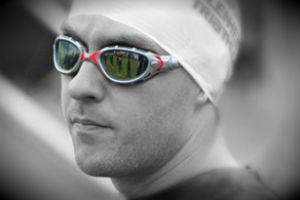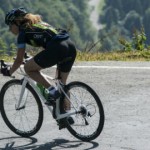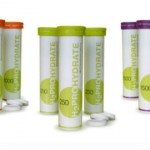 Joel Enoch is one of the UK’s leading sport scientists and motivational speakers, renowned for a straightforward approach that aims to demystify nutrition. Cyclo talked Joel at this year’s Triathlon Show and, in this second of our two-part interview (read part one here), we discussed carbohydrate loading, drip-feeding strategies, omega oils and sports supplements…
Joel Enoch is one of the UK’s leading sport scientists and motivational speakers, renowned for a straightforward approach that aims to demystify nutrition. Cyclo talked Joel at this year’s Triathlon Show and, in this second of our two-part interview (read part one here), we discussed carbohydrate loading, drip-feeding strategies, omega oils and sports supplements…
Cyclo: What are your thoughts on carb loading? There seem to be as many approaches as there are athletes…
Joel Enoch: Carbohydrate loading gives a certain impression… ‘loading!’ it’s a big word, a loaded word. It gives the impression that you have to eat as much pasta or potatoes or rice as you possibly can. But really carb loading is all about tweaking your diet, but equally about getting the timing of that loading right.
Cyclo: What strategy would you advise?
Joel Enoch: A classic carb loading protocol is that a week before a race you drop carbs out for three days, this increases your bodies ability to use fat quite effectively as a fuel; then you bring carbs back in three days before you race.
But the issue with that is that people often wake up on the day of the race having over eaten carbs for three days, feeling bloated, feeling lethargic and needing the toilet – which can be a massive issue… That can be avoided; there are studies that show that if you have an increased amount of carb for two to three days you can maintain those elevated glycogen stores in the body for up to five days. So maybe what we should be doing is having that loading period on the Tuesday, Wednesday, Thursday (before a race on the Sunday) and then over the two days before the race just having quite plain foods, tapering the carbs. For me the night before a race my meal is often just a salad, which means I wake up on race day feeling ready for breakfast and feeling fresh and alert.
Cyclo: So, not all about big changes?
Joel Enoch: Not at all, it’s very small tweaks. Look at every meal though – make a diet or meal plan for the week before, that’s useful. Then look at each meal and just look at the carb element of each one and add a few grams of carb, perhaps just knock back a little fat and a little protein. Very small changes… It comes back to the British Cycling mantra – the aggregation of marginal gains. Small changes that add up to a big total shift.
Cyclo: What about the problems of taking carbohydrates on during an event or long training session?
Joel Enoch: The body is more likely to have difficulty digesting, absorbing and using particularly carbohydrates during exercise because of the way the blood shunts away from the major organs and into the working muscles if you take on board big dollops of carbs just in one big go; so the more you can spread it out the better.
Now, the kind of racing dictates how much you can spread it out. For example in an Olympic distance triathlon race it is likely, at elite level, that they don’t have time to be messing about with drip-feeding, so it’s a case of working hard in training to make sure their bodies can handle, lets say one gel and a moderate consistence sports drink – just taking that one gel in one go and that will be it. They practice that in training and try different products to make sure their bodies can handle that without stomach problems.
Cyclo: But if the luxury of drip-feeding is possible?
Joel Enoch: Well, if your talking about a longer event, then there is the luxury of drip-feeding, every ten to 15 minutes a little bit of carb a little bit of fluid, then that way the stomach can cope with absorbing that amount of carb and fluid. So drip-feeding is one of the key things I would say to anyone.
Cyclo: What are your thoughts on Omega supplements?
Joel Enoch: The reason people would supplement Omega3 in particularly is that we have an imbalance of two types of fat – Omega6 and Omega3 – in out diet. Omega6 are in vegetable oils so they are in all sorts of things, even processed foods.
Omega3s are only in a very few types of food: oily fish, walnuts, avocados, olives and a couple of other types of oil; that’s about it, so we end up with this imbalance in the ratio between the two types of fat. There’s nothing wrong with either of them, but the imbalance causes an increase in inflammation in the body and that can inhibit recovery. Because it’s so difficult to get enough Omega3 oils into our diet supplementing can be useful, particularly if you are someone that doesn’t eat fish. It can certainly help an athlete’s recovery.
Cyclo: What about the broader issue of supplements? Do multivitamins have their use??
Joel Enoch: They can have. In theory all of the vitamins and minerals that we need we can get from our diet, so my initial answer is no we don’t really need these supplements. However, the vitamin and mineral content of foods is changed, quite dramatically, by how that food was stored, how it was transported, how longs it’s been since harvesting and also the cooking process which denatures the vitamin and mineral content of fruit and vegetables quite dramatically. So, when you eat a fruit or veg that should be rich in these you cant be certain it actually is when you put it into your body.
As an athlete I choose to have a safety net underneath my usual healthy, nutritional intake which first of all looks to have some fortified foods added to my diet – if you look at some cereals or something like Clif Bars (read the Cyclo review here) – those would be fortified with vitamins and minerals and that’s another way of having a food source that’s rich in vits and mins. So real food is our first choice, then fortified foods our second and then, if we still feel like we might need more supplementation, then we might take a multivitamin.
Cyclo: That’s something you do?
Joel Enoch: Yes, It’s something I do on a daily basis, but I choose the multivitamin that has the smallest amount of all the vitamins and minerals. You often see vitamin C 2000-times your recommended daily amount! Why do I need 2000-times? That doesn’t make any sense at all. For me it’s no more that a safety net.
Cyclo: Nitrate supplementing is something you say you find quite exciting…
Joel Enoch: Nitrates that are found in beetroot juice are showing quite exciting results across all of the studies so far – what’s rather unique, despite quite small study groups, is that 100% of test subjects across all of the tests have shown improvements in performance; it’s almost entirely consistent – everyone using oxygen at 17-20% greater capacity than they would do normally and without that supplement. Yes, we still need more testing, we still need more results, but it’s a very exciting area of research and something that many of the top athletes are already using. Even if it doesn’t have an effect on oxygen capacity it will help your antioxidant count to aid recovery, so there’s certainly an application there and a number of products are coming out that exploit that.
 In addition to Joel’s work as a sports scientist he is also an accomplished triathlete having raced in three European Age Group Championships (2008, 2009, 2010) two World Age Group Championships (2009, 2010), and domestic Elite races including London and Blenheim. His sponsors include Clif Bar (read our Clif Bar review here), 2Pure, Nine Point Nine, claireLOGIC Ltd, Kurt Kinetic, Orca UK, POC Sports and Zoggs. For more information on Joel’s work see joelenoch.com
In addition to Joel’s work as a sports scientist he is also an accomplished triathlete having raced in three European Age Group Championships (2008, 2009, 2010) two World Age Group Championships (2009, 2010), and domestic Elite races including London and Blenheim. His sponsors include Clif Bar (read our Clif Bar review here), 2Pure, Nine Point Nine, claireLOGIC Ltd, Kurt Kinetic, Orca UK, POC Sports and Zoggs. For more information on Joel’s work see joelenoch.com
Read part one of this interview here.




